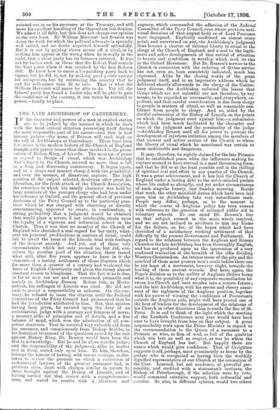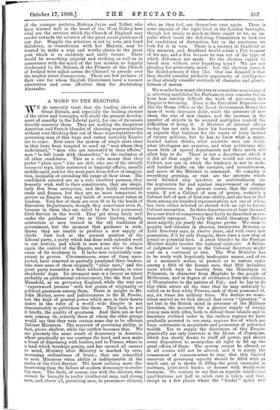THE LATE ARCHBISHOP OF CANTERBURY.
IF the character and powers of a man in exalted station are to be judged by the manner in which he deals with the most critical situation presenting itself during the most responsible part of his career—and that is how history judges—the name of Benson will rank high on the roll of Archbishops of Canterbury. There have been few crises in the modern history of the Church of England fraught with graver issues than those involved in the prose- cution of Bishop King, of Lincoln. The message of peace in regard to things of ritual, which was Archbishop Tait's legacy to the Church, secured no more than a lull in a long and distressing controversy. It began again, and in a shape and manner charged with the possibility, and even the menace, of disastrous rupture. The high position of the culprit selected, doubtless after great de- liberation, for the fresh attack of the Church Association, the reverence in which his saintly character was held by large numbers of the younger clergy who had been under his influence at Oxford, and the general effect of previous decisions of the Privy Council as to the particular prac- tices which he was charged with observing or directly countenancing, appeared to create, in combination, a strong probability that a. judgment would be obtained that would place a severe, if not intolerable, strain upon the loyalty of a vigorous and influential school in the Church. Thus it was that no member of the Church of England who cherished a real regard for her unity, what- ever his personal predilections in matters of ritual, could fail to await the issue of the Lincoln trial with feelings of the deepest anxiety. And yet, out of those very circumstances which not only seemed to, but did, con- stitute the peculiar peril of the situation, there issued what still, after five years, appears to have in it the elements of a lasting settlement of those disputes which for more than a quarter of a century had weakened the force of English Christianity and given the enemy almost constant reason to blaspheme. That the fact is so is due, m far as men can see and are concerned, primarily and mainly to Archbishop Benson. Before him, as Metro- politan, his suffragan of Lincoln was cited. He did not rush to adept a responsibility so arduous. On the con- trary, he refused to issue the citation until the Judicial Committee of the Privy Council had pronounced that he had the jurisdiction attributed to him. But, that opinion having been given, he entered upon the duty of an ecclesiastical judge with a courage and firmness of nerve, a mastery alike of principles and of details, and a fine balance of mind, which won the admiration of all com- petent observers. That he received very valuable aid from his assessors, and conspicuously from Bishop Stubbs, in his historical treatment of the questions raised by the suit against Bishop King, Dr. Benson would have been the first to acknowledge. But he and he alone was the judge ; and the responsibility of the judgment, alike in matter and in form, rested only upon him. To him, therefore, belongs the honour of having, with serene courage, under- taken to review the grounds on which a succession of ecclesiastical lawyers of the greatest eminence had, in previous suits, dealt with charges similar in nature to those brought against the Bishop of Lincoln, and of having carried out that review with a comprehensive- ness, and stated its results with a clearness and cogency, which commanded the adhesion of the Judicial Committee of the Privy Council, even where previous anti- ritual decisions of that august body or of Lord Penzance were impugned. Explicitly confirmed on almost every point, and unreversed on any, the Archbishop's judgment thus became a charter of rational liberty in ritual to the clergy of the Church of England, and a seal to the legiti- mate and sober developments of that revival of attention to beauty and symbolism in worship which took its rise in the Oxford Movement. But Dr. Benson's service to the Church in connection with the ordering of divine service has not, even so, been completely indicated, much less expressed. Alike by the closing words of the great judgment itself, and in an impressive address which he delivered shortly afterwards to the clergy of the Canter- bury diocese, the Archbishop enforced the lesson that things which are not unlawful are not therefore, by any means, to be regarded as necessarily, and everywhere, ex- pedient, and that careful consideration is due from clergy to people in matters of ritual, as well as reasonable con- fidence from people to clergy. And so, aided by the dutiful submission of the Bishop of Lincoln on the points on which the judgment went against him—a submission which had been much facilitated by the character and tone of the judgment and the personality of the judge —Archbishop Benson used all his power to prevent the development of injurious irritation among the members of that earnest and active section of the Church to whom the liberty of ritual which he sanctioned was certain to seem undesirable and dangerous.
It may, therefore, be rightly claimed for the late Primate that he established peace when the influences making for rupture seemed to have revived in a most threatening form, and that he did so at the least possible cost in the chilling of spiritual zeal and effort in any quarter of the Church. It was a great achievement, and it has laid the Church of England under a lasting debt to the noble-minded prelate whose life ended so abruptly, and yet under circumstances of such singular beauty, last Sunday morning. Beside that work, the other manifold duties which have been laid upon him as Archbishop take very subordinate rank. People may differ, perhaps, as to the manner in which the course of Anglican policy has been steered with reference to the question of enlarged public aid to voluntary schools. To our mind Dr. Benson's line on that subject seemed in the main wisely inspired, and we are not inclined to attribute to him any blame for the failure, so far, of the hopes which had been cherished of a satisfactory working settlement of that difficulty by the present Government and Parliament. In regard to the relations between the Anglican and Roman Churches the late Archbishop has been thoroughly English, and has not produced upon us the impression of a very profound realisation of the breadth of the rifts dividing Western Christendom. An intense sense of the pity and the mischief of them must possess men's souls before there can be any hope of a movement, however slight, towards the healing of these ancient wounds. But here, again, the Pope's decision as to the nullity of Anglican Orders being what it is, the possibility of any corporate reconciliation be- tween his Church and ours recedes into a remote future; and the late Archbishop, with his serene and cheery assur- ance of the rightness of the Anglican position, together with his power of winning the confidence of Protestants outside the Anglican pale, might well have proved one of the best of leaders for the development of the relations of his Church in other directions than towards the See of St. Peter. It is sad to think of the light which the meeting of the Lambeth Conference next year would have been sure to have brought from him on that subject. A great responsibility rests upon the Prime Minister in regard to the recommendation to the Queen of a successor to a Primate so wise, so firm of soul, so full of the qualities which win love as well as respect, as was he whom the Church of England has lost. But happily there are names which would give confidence. That of Creighton suggests itself, perhaps, most prominently as borne by the prelate who is recognised as having been the worthily dignified representative of our Church at the coronation of the Czar. Learned, but not academic, of powerful per- sonality, and credited with a statesman's instincts, the Bishop of Peterborough, if the selection were by vote, would command extensive support, both influential and popular. So also, in different spheres, would two others of the younger prelates, Bishops Jayne and Talbot, who have learned well in the heart of the West Riding how vital are the services which the Church of England may render towards the solution of the great social problems of our day. Happily the selection is not by vote, and Lord Salisbury, in consultation with her Majesty, may be trusted to make a wise and worthy choice to the great post which is so suddenly and sadly vacant. There would be something original and striking, as well as in consonance with the spirit of the last mission so happily discharged by Dr. Benson, if the Primate of the Church of Ireland were called across the Channel to preside over the mighty sister Communion. There are few prelates of their own for whom English Churchmen have a warmer admiration and even affection than for Archbishop Alexander.







































 Previous page
Previous page